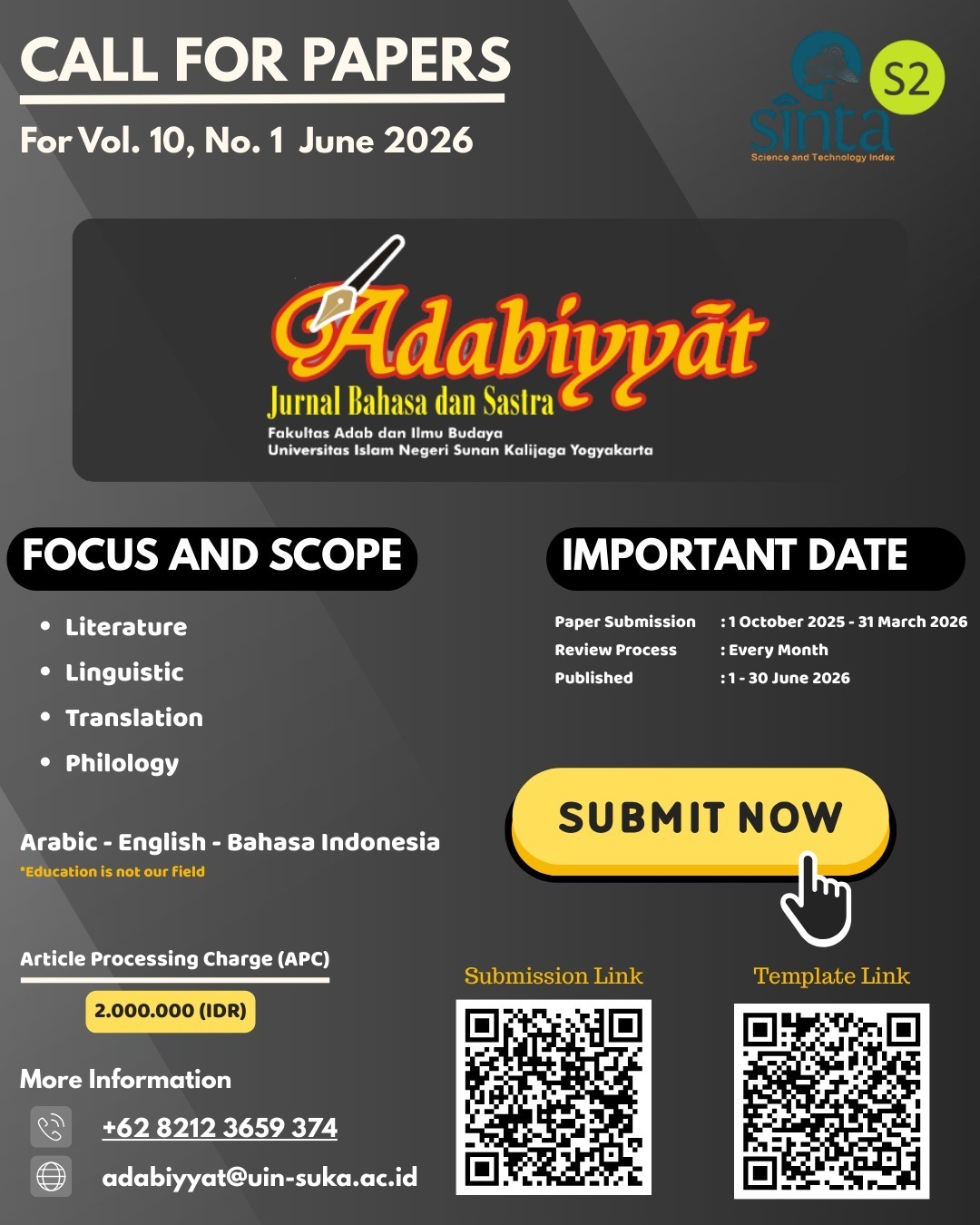PRESIDEN JOKO WIDODO: POTRET TINDAK TUTUR PENANGANAN MASALAH SOSIAL-POLITIK BANGSA
DOI:
https://doi.org/10.14421/ajbs.2015.14201Abstract
This research intends to elaborate the types and domains of President Joko Widodo’s speaking politeness strategies in addressing the nation’s socio-political issues. The simplified Brown and Levinson’s (1987) speaking politeness strategies have been employed to achieve the intended purpose of this investigation. The data was collected through listening method and the extra-lingual equivalent method was employed to analyze the data (Sudaryanto, 1993; Mahsun, 2005). Among the eleven speaking politeness strategies proposed by Brown and Levinson (1987), never has President Joko Widodo employed a joke strategy. It might be because the strategy is thought inappropriate with the topic delivered and is considered as a threat for national socio-political stability. The avoid disagreement strategy and the promise-offer strategy are the most often used strategies by President Joko Widodo, sharing 20% of each; followed by the in-group identitiy markers strategy and the intensify interest-seek agreement strategy, sharing 12% of each; the strategy of notice; attend to interest-wants (2%), and the four remaining strategies which counted for 7% each. The speech acts performed by President Joko Widodo contain some politeness strategies with considerable perlucosion power. However, the dominant use of certain strategies is mainly caused by the socio-cultural inferences, which influence the speaker to perform speech acts, rather than the speaker’s awareness and consciousness for selecting those strategies. The knowledge of dominant strategies of speaking politeness practiced by President Joko Widodo can be used as a base for understanding the pattern of the president’s characteristics to deal with the nation’s social and political issues.
Downloads
References
Gunarwan, Asim. 1992. “Persepsi Kesantunan Direktif di dalam Bahasa Indonesia di antara Beberapa Etnik di Jakarta”, dalam Kaswanti Purwo (ed.) Bahasa dan Budaya. Jakarta: PELBA 5.
Gunarwan, Asim. 2005. “Beberapa Prinsip dalam Komunikasi Verbal: Tinjauan Sosiolinguistik dan Pragmatik”, dalam Pranowo (2005). Yogyakarta: Universitas Sanata Dharma.
Gunarwan, Asim. 2007. “Implikatur dan Kesantunan Berbahasa: Beberapa Tilikan dari Sandiwara Ludruk”. PELLBA 18. Jakarta: Pusat Kajian Bahasa dan Budaya Atma Jaya.
Leech, Geoffrey. 1983. The Principles of Pragmatics. London: Longman Group Limited.
Levinson, Stephen. 1983. Pragmatics. London: Cambrigde University Press.
Mahsun. 2005. Metode Penelitian Bahasa: Aneka Teknik dan Strateginya. Jakarta: Rajagrafindo.
Nadar, F. X. 2009. Pragmatik dan Penelitian Pragmatik. Yogyakarta: Graha Ilmu.
Pranowo. 2008. “Kesantunan dalam Pemakaian Bahasa Indonesia”. Laporan Hasil Penelitian. Yogyakarta: Universitas Sanata Dharma.
Pranowo. 2009. Berbahasa secara Santun. Jakarta: Erlangga.
Rahardi, Kunjana. 2000. Imperatif dalam Bahasa Indonesia. Yogyakarta: Duta Wacana University Press.
Rahardi, Kunjana. 2006. Pragmatik: Kesantunan Imperatif dalam Bahasa Indonesia. Jakarta: Erlangga.
Rahardi, Kunjana. 2009. Sosiopragmatik: Kajian Imperatif dalam Wadah Konteks Sosiokultural dan Konteks Situasionalnya. Jakarta: Erlangga.
Sudaryanto. 1993. Metode dan Aneka Teknik Analisis Bahasa, Pengantar Penulisan Wahana Kebudayaan secara Linguistis. Yogyakarta: Duta Wacana University Press.
Yule, George. 2002. Pragmatics. Oxfo rtd: Oxford University Press.
Downloads
Published
Issue
Section
License
Copyright (c) 2016 Burhanuddin Burhanuddin, Sumarlam Sumarlam

This work is licensed under a Creative Commons Attribution-ShareAlike 4.0 International License.
- Adabiyyāt: Jurnal Bahasa dan Sastra publishes all articles entirely in full text.
- It is permissible for readers to download and to use it for scientific purposes and scientific dissemination.
- The author can re-publish the article that has been published by the Adabiyyāt: Jurnal Bahasa dan Sastra after obtaining written permission from the editor. This letter can be obtained by submitting a request letter for permission to republish the article to Adabiyyāt: Jurnal Bahasa dan Sastra via email adabiyyat@uin-suka.ac.id. In the second publication, the author is required to include information that the article was firstly published by the Adabiyyāt: Jurnal Bahasa dan Sastra.









